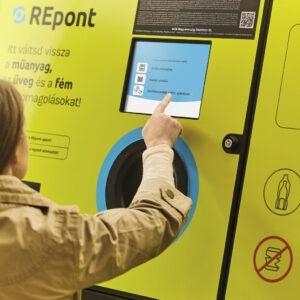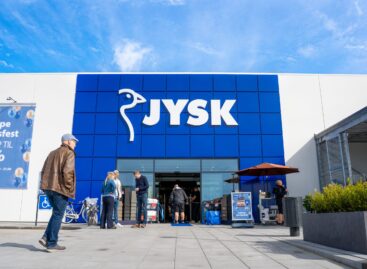Survey: 98 percent of Hungarians use the cashback system
Hungary is leading the way in the use of the mandatory return system (DRS), according to a recent international study covering 16 countries. The “Global Recycling Habits and Attitudes 2025” survey commissioned by Every Can Counts showed that 98 percent of Hungarian respondents use the DRS, and 82 percent use it regularly. According to the study, Hungarians also have a higher understanding of the concept of sustainable packaging than average: 66 percent (compared to the global average of 57 percent) consider truly sustainable packaging to be something that can be recycled into the same type of product over and over again.
 According to a recent international study covering 16 countries, Hungary is now one of the most successful markets for circular packaging and the mandatory return system. The survey, which involved more than 16,000 people, shows that 71 percent of people worldwide support deposit return schemes (DRS), and 88 percent believe that returned beverage packaging is actually recycled. Hungary stands out in this environment as well: 98 percent of Hungarian respondents already use the deposit return scheme and also understand the concept of sustainable packaging more consciously than average. The research was conducted by Made with Insight on behalf of the international awareness program Every Can Counts, with 1,015 people participating in Hungary.
According to a recent international study covering 16 countries, Hungary is now one of the most successful markets for circular packaging and the mandatory return system. The survey, which involved more than 16,000 people, shows that 71 percent of people worldwide support deposit return schemes (DRS), and 88 percent believe that returned beverage packaging is actually recycled. Hungary stands out in this environment as well: 98 percent of Hungarian respondents already use the deposit return scheme and also understand the concept of sustainable packaging more consciously than average. The research was conducted by Made with Insight on behalf of the international awareness program Every Can Counts, with 1,015 people participating in Hungary.
Hungary leads the way in the use of deposit return
Based on the data from the countries included in the survey that have already implemented the DRS – Ireland, Romania, the Netherlands and Hungary – participation will be massive almost immediately once the system is launched. According to the survey, 90 percent of respondents in these countries participate in the deposit return scheme. Hungary stands out even from this narrow circle: 98 percent of Hungarian respondents said they use the return system, and only 2 percent said they never participate in it.
The system has not only become known, but has become a regular habit. 54 percent of Hungarian respondents said they always return empty beverage packaging, and another 28 percent do so often. This means that 82 percent of the population uses the system regularly, integrating it into their everyday lives. Trust in DRS also fits the international trend: 88 percent worldwide believe that returned packaging actually becomes raw material again, and Hungary is among the countries with a high level of trust.
Age-specific data suggest that return is especially self-evident for older people. Support for DRS among the Baby Boomer generation is 80 percent, while among Gen Z (16–28 years old) it is 59 percent. For older people, recycling is not a new phenomenon, but rather the return of a familiar practice, while for younger people it is more important to receive a clear explanation and personal experience about recycling.
What does sustainability mean to Hungarians?
One of the most interesting results of the survey is how Hungarians define sustainable packaging. Globally, 57 percent of respondents describe truly recyclable packaging as being able to be recycled into the same type of product over and over again. In Hungary, this rate is 66 percent, higher than the international average, and this puts our country in the top spot along with Brazil, Romania, Greece and Poland.
For 41 percent of Hungarian respondents, it is also important that the packaging contains recycled material. The research also shows that in countries that use DRS – including Hungary – many people identify sustainability with reusability, i.e. with the ability to use a package multiple times. At the level of everyday thinking, sustainability therefore means much more than just selective collection.
“Sustainability does not have to be about complicated technical terms,” said Van Heuverswyn, Global Director of Every Can Counts. “The survey shows that people are increasingly thinking that good packaging is one that can be recycled into the same type of product over and over again. The aluminum beverage can does exactly this, yet few people are aware of its performance. This is the awareness gap that we need to close.”
Hungary is leading the way in the use of the mandatory return system (DRS), according to a recent international study covering 16 countries. The “Global Recycling Habits and Attitudes 2025” survey commissioned by Every Can Counts showed that 98 percent of Hungarian respondents use DRS, and 82 percent use it regularly. According to the research, Hungarians also have a higher than average understanding of the concept of sustainable packaging: 66 percent (compared to 57 percent)
Related news
Hungarians don’t replace their furniture – JYSK research reveals a conscious, long-term planning market
🎧 Hallgasd a cikket: Lejátszás Szünet Folytatás Leállítás Nyelv: Auto…
Read more >Related news
Tourism Business Index: improving sentiment, but the sector remains in the red
🎧 Hallgasd a cikket: Lejátszás Szünet Folytatás Leállítás Nyelv: Auto…
Read more >Lamb Days – Gastronomic Adventure is coming again on March 28–29!
🎧 Hallgasd a cikket: Lejátszás Szünet Folytatás Leállítás Nyelv: Auto…
Read more >Table reservations for National Restaurant Week start with unchanged prices
🎧 Hallgasd a cikket: Lejátszás Szünet Folytatás Leállítás Nyelv: Auto…
Read more >








